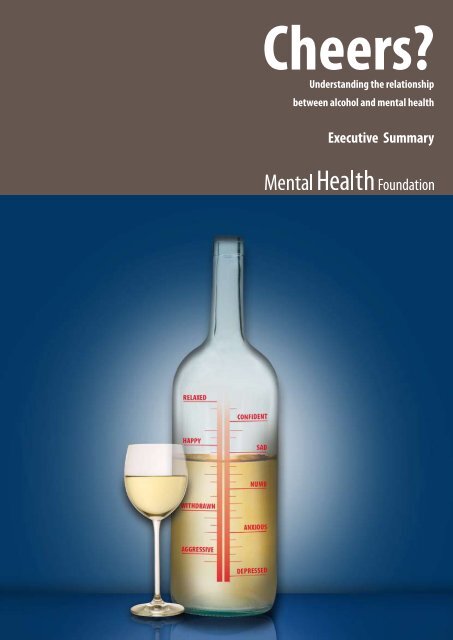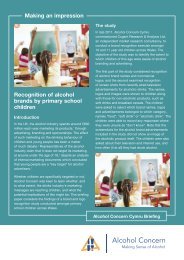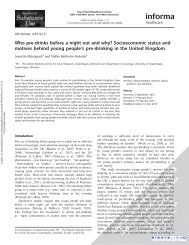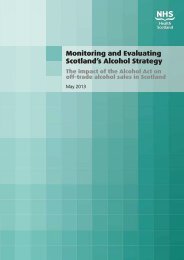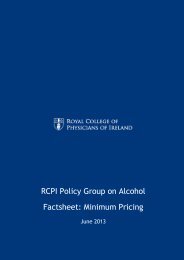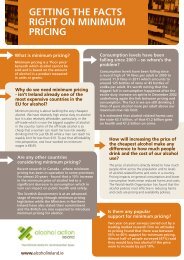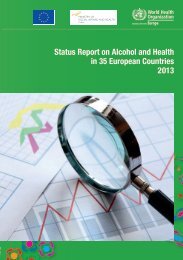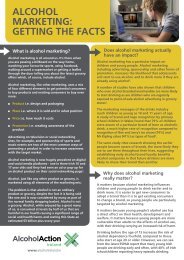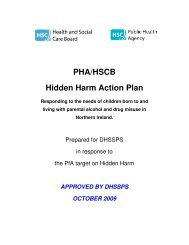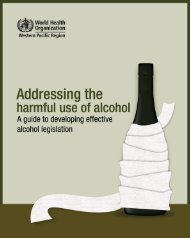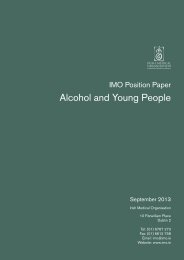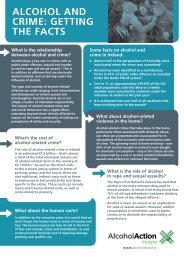Executive Summary - Alcohol Action Ireland
Executive Summary - Alcohol Action Ireland
Executive Summary - Alcohol Action Ireland
You also want an ePaper? Increase the reach of your titles
YUMPU automatically turns print PDFs into web optimized ePapers that Google loves.
Cheers?<br />
Understanding the relationship<br />
between alcohol and mental health<br />
<strong>Executive</strong> <strong>Summary</strong>
While much debate has taken place<br />
recently about alcohol, we have<br />
failed to draw out the reasons why<br />
so many people have troubled<br />
relationships with it. The reasons<br />
we drink and the consequences<br />
of excessive drinking are intimately<br />
linked with our mental health, and<br />
this holds the key to dealing with<br />
growing worries about alcohol<br />
misuse.<br />
<br />
CHEERS?
Foreword<br />
Each year the Mental Health Foundation uses mental health action week to highlight an area of concern about<br />
the mental health of the general population.<br />
For too long mental health has been mysterious to ‘ordinary’ people, and is seldom talked about in comparison to<br />
many areas of physical health. Yet one in four of us will experience a mental health problem each year. The need<br />
for mental health to be demystified is urgent.<br />
We have been working for many years to give ordinary people the information they need to better understand<br />
their own – and others’ mental health. Recently we have covered practical topics such as the importance of diet<br />
and exercise to mental health, and the suffering caused to ordinary people with mental health problems because<br />
of the prejudice and ignorance surrounding mental illness.<br />
The message is clear – mental health is everyone’s business, just like physical health. As a society we must get<br />
better at understanding mental health, if we are to tackle some of the major health, economic and social burdens<br />
that face current and future generations.<br />
One of the least explored but most fundamentally important factors in the mental health of the general<br />
population is our use of alcohol. While much debate has taken place recently about alcohol, we have failed to<br />
draw out the reasons why so many people have troubled relationships with alcohol. The reasons we drink and the<br />
consequences of excessive drinking are intimately linked with our mental health, and this holds the key to dealing<br />
with growing worries about alcohol misuse. But once again, mental health is swept under the carpet while debate<br />
focuses on the physical consequences of alcohol misuse.<br />
While this is just one example of how mental health is a crucial factor that is omitted from virtually every national<br />
debate, it is a vitally important one, and I am pleased that our research will add to the evidence. We hope it will<br />
spark and inform further debate, and offer useful directions to those who are rightly concerned.<br />
Dr Andrew McCulloch<br />
Chief <strong>Executive</strong><br />
Mental Health Foundation<br />
CHEERS?
Acknowledgements<br />
This report was written by Dr Deborah Cornah, an independent consultant. Face-to-face interviews were<br />
conducted by Jo Sherlock, an independent researcher.<br />
It was commissioned and edited by Celia Richardson, Director of Communications at the Mental Health<br />
Foundation, with research and policy direction from Iain Ryrie, Research Director and Dr Andrew McCulloch, Chief<br />
<strong>Executive</strong> of the Mental Health Foundation.<br />
We would like to thank all of the people who shared their stories with us for the report. Their names and some of<br />
their personal details have been changed.<br />
Thanks are also due to Laura Gibson, Fran Gorman, Jordanna Greaves, Gillian McEwan, Mark Peterson and Tara<br />
StJohn, members of the Foundation’s Communications Team, for their ideas and opinions, and for producing and<br />
promoting ‘Cheers?’<br />
‘‘I was a carer for my mother and an elderly relative. I found I was not able to deal with all the emotions around<br />
that and drank to help me block the emotions out, to be normal, not to feel anxious, not to have a million<br />
different worries going around my head. It’s partly to do with the way I learnt to deal with things. I drank to<br />
medicate myself.”<br />
Elizabeth, in her mid-thirties, was placed on suicide watch in a psychiatric hospital after her long-term<br />
drinking habit spiralled out of control.<br />
CHEERS?
EXECUTIVE SUMMARY<br />
How and why we use alcohol<br />
<strong>Alcohol</strong> has been an important part of our society and culture for many centuries. People of all ages across the UK<br />
have an intimate relationship with alcohol, with positive as well as negative effects in the short and longer term.<br />
<strong>Alcohol</strong> is tied up with many areas of our lives, and we use it in a plethora of ways: to help us relax, feel brave,<br />
introduce ourselves, seal business deals, celebrate life events, drown our sorrows, remember, forget, welcome<br />
people, say goodbye to people, get to know people, manipulate people, because we feel like it, because we need<br />
it, to numb ourselves, to feel grown up, to feel young, to belong, to distinguish ourselves, and sometimes, because<br />
we’ve forgotten how to do anything without alcohol.<br />
Over the past fifty years alcohol consumption has doubled in the UK. Recent figures show that 38% of men<br />
and 16% of women are drinking above recommended limits and can be classed according to World Health<br />
Organisation standards as having an alcohol use disorder. This is equivalent to 8.2 million people in England alone.<br />
And 1.1 million people nationally are alcohol dependent. Young people in the UK drink more than in nearly all<br />
other countries in Europe.<br />
Concerns about these facts are reflected in recent policy developments. These are largely focused on reducing<br />
harm such as damage to physical health, violence and anti-social behaviour. Much media debate about the<br />
growth in alcohol consumption, especially among young people, has centred on binge drinking, anti-social<br />
behaviour, and serious physical alcohol-related complaints such as liver disease.<br />
Far less attention has been paid to the links between alcohol and mental health, and there has been<br />
comparatively little public exploration of why we drink. The Prime Minister recently described binge drinking as<br />
“the new British disease”, but is alcohol misuse more like a symptom of other problems?<br />
Research outlined in this report shows that many people in the UK drink alcohol in order to help them cope with<br />
emotions or situations that they would otherwise find difficult to manage.<br />
At the simplest level, we often drink because we wish to alter our mood – or change our mental state. This may<br />
involve the desire to quell feelings of anxiety or depression, or other low-lying mental health or mood problems,<br />
for want of a better way of dealing with them.<br />
There is much research that indicates that people who consume high amounts of alcohol are vulnerable to higher<br />
levels of mental ill health. According to the World Health Organisation: “Sufficient evidence now exists to assume<br />
alcohol’s contributory role in depression 6 .”<br />
Severe mental illness and alcohol<br />
At the more severe end of the spectrum, the co-existence of alcohol problems and mental ill-health is<br />
very common, and often referred to as “dual diagnosis”. The idea that people ‘self-medicate’ their mental<br />
health problems using alcohol is also very well known and documented. The basic premise is that the<br />
psychopharmacological properties of alcohol help individuals deal with negative effects of mental ill-health<br />
by altering the chemistry of the brain, which in turn counters the negative feelings. The prevalence of alcohol<br />
dependence among people with psychiatric disorders is almost twice as high as in the general population.<br />
People with severe and enduring mental illnesses such as schizophrenia, are at least three times as likely to be<br />
alcohol dependant as the general population.<br />
CHEERS?
<strong>Executive</strong> <strong>Summary</strong><br />
Mood, mental health and alcohol<br />
Self-medication is not a concept that can only be applied to people with diagnosed mental health problems, and<br />
is in fact a useful way to describe many of the reasons we drink. Little has been said in public policy documents<br />
about the way the general population relies on alcohol – a legally available drug – as a mood-altering substance<br />
that is used to mask other problems, or to deal with emotions.<br />
<strong>Alcohol</strong> is a toxic substance in terms of its direct and indirect effects on the chemistry of the brain and other<br />
body organs and systems. The initial impact of a drink – that “winding down” or relaxing feeling – is a reflection<br />
of almost immediate chemical changes occurring in the brain’s nerve cells (neurons) in response to alcohol. As<br />
more alcohol is consumed, increasingly sensitive parts of the brain become affected and behaviour changes<br />
accordingly. The first drink for many people (although not all) depresses the parts of the brain that are associated<br />
with inhibition, increasing talking and self-confidence and reducing social anxiety. As more alcohol enters the<br />
bloodstream, the areas of the brain associated with emotions and movement are affected, often resulting in<br />
exaggerated states of emotion (anger, withdrawal, depression or aggressiveness) and uncoordinated muscle<br />
movements. <strong>Alcohol</strong> then depresses the nerve centres in the area that controls sexual arousal (which increases)<br />
and performance (which doesn’t).<br />
Drinking to relieve anxiety and depression<br />
There is much evidence to show that many people drink to help deal with anxiety and depressive thoughts. It<br />
reveals that alcohol can be a favourite coping mechanism. When the results of a recent survey were extrapolated<br />
to the general population, researchers found that up to 12 million adults in the UK drink to help them relax or<br />
overcome feelings of depression.<br />
There are two potential problems in using this coping mechanism. Firstly, self-medicating with alcohol can<br />
become self-perpetuating. Underlying anxiety leads to increased alcohol use, which changes the physiology<br />
of the brain and leads to a depletion of the neurotransmitters (the brain’s ‘messengers’) that it needs to reduce<br />
anxiety naturally. Therefore, the individual feels more anxious and needs more alcohol to ‘numb’ their anxiety. In<br />
the long term, this can lead to an individual becoming tolerant of alcohol – that is, they need increasingly large<br />
amounts of drink to experience the same reduction in their anxiety.<br />
The second problem with using alcohol to self-medicate is that it is difficult to maintain exactly the amount of<br />
alcohol needed to reduce the negative feelings. Keeping the optimum balance of alcohol to reduce anxiety is<br />
almost impossible because the effect of alcohol on the brain is such that after the initial ‘euphoria’ or stimulation<br />
from the first drink, alcohol acts as a depressant and the feelings of anxiety may rapidly return. Increased drinking<br />
to cope with those feelings leads to a rapid increase in the levels of alcohol in the blood and may become<br />
counter-productive.<br />
The problem with drinking to relieve depression is similar to the problems described above with anxiety.<br />
Regular drinking changes the chemistry of the brain and, of particular relevance here, depletes the levels of the<br />
neurotransmitter serotonin. This is a brain chemical implicated in depression. This leads to the cyclical process<br />
of drinking to relieve depression, becoming more depressed as levels of serotonin become more depleted,<br />
thus needing more alcohol to medicate the depression. Increased alcohol consumption can also affect social<br />
relationships and work life, which in turn can contribute to depression 3 .<br />
<strong>Alcohol</strong> depresses the Central Nervous System, and this can have a disinhibiting effect which can reveal or amplify<br />
our underlying feelings. This is one of the reasons that many people become angry or aggressive when drinking. If<br />
our underlying feelings are of anxiety and low mood then alcohol can also exaggerate them.<br />
CHEERS?
<strong>Executive</strong> <strong>Summary</strong><br />
In short, drinking to mask anxiety, depressed mood or general unease has the opposite effect either when blood<br />
alcohol levels increase or once the drink wears off. This is why a physical hangover is very often accompanied by<br />
anxiety or low mood.<br />
“I don’t really know when I started drinking. I should say I have had various breakdowns due to depression and<br />
with those I have always tended to drink alcohol. I was drinking enough to stay numb.”<br />
Susan, 53, retired nurse<br />
What the evidence shows<br />
Evidence outlined in this report has shown that:<br />
•<br />
•••<br />
•<br />
•<br />
•••••<br />
there are significant connections between reported alcohol use and depressive symptoms<br />
people report using alcohol to help them sleep<br />
people drink more when experiencing moderate to high levels of shyness or fear<br />
anxious people use drinking ‘to cope’ and are more likely to avoid social situations where<br />
alcohol is not available<br />
as many as 65% of suicides have been linked to excessive drinking<br />
70% of men who kill themselves have drunk alcohol before doing so<br />
almost a third of suicides amongst young people are committed while the person is intoxicated<br />
anxiety and depressive symptoms are more common in heavy drinkers<br />
heavy drinking is more common in those with anxiety and depression<br />
there is a significant relationship between job stress and alcohol consumption<br />
Many GPs believe that alcohol is a cause of mental health problems.<br />
Implications<br />
The consumption of alcohol can have positive as well as negative effects. There is some evidence associating light<br />
drinking with improved emotional, mental and physical health.<br />
But there is an emerging picture of alcohol use as a way of masking problems, and helping us cope with emotions<br />
we would otherwise find it too difficult to deal with. Many of the personal stories outlined in this report paint<br />
a picture of loss caused by over-consumption of alcohol – from the loss of important memories linked with<br />
important occasions; to the loss of work, relationships and self-esteem.<br />
While we are keen to deplore publicly the phenomenon of binge drinking among young people, it must be<br />
noted that binge drinking is not new, and beliefs and attitudes to alcohol are not unique to younger generations.<br />
They have learned how to use alcohol from a very young age in a society where alcohol is medicine, Dutch<br />
Courage, a relaxant, proof of friendship and the lubricant for all celebrations.<br />
As concern about alcohol use grows, so will Government policy and guidance, as well as advice about tackling<br />
problem alcohol use in health services, schools and families. It is crucial that research, policy and attitudes do not<br />
focus on pricing, availability and treatment at the expense of risk factors and triggers for problem alcohol use,<br />
emotional health and alternative coping strategies.<br />
Methods of dealing with alcohol misuse must be linked very closely to emotional wellbeing programmes in<br />
schools, parenting initiatives, mental health promotion, public health policy and the identification and treatment<br />
of underlying causes.<br />
CHEERS?
<strong>Executive</strong> <strong>Summary</strong><br />
The Government’s public health White Paper Choosing Health made ‘encouraging and supporting sensible<br />
drinking’ one of its six overarching priorities along with smoking, diet, exercise, sexual health and mental heath.<br />
Because of the close link between alcohol and mental Health, it would not be advisable for the Government to<br />
formulate any further policy or guidance on drinking without serious exploration of the mental and emotional<br />
health causes and effects.<br />
1.1 Key Statistics from NOP survey conducted for this report<br />
Q. How does drinking alcohol make you feel…?<br />
Relaxed<br />
•<br />
••<br />
•<br />
77% of the sample reported that drinking makes them feel relaxed<br />
85% of 25-44 year olds reported this, compared with 63% of over 65s<br />
88% of those in full time employment reported this, compared with 61% of those not working<br />
Happy<br />
63% of the sample said alcohol makes them feel happy<br />
More confident<br />
•<br />
•<br />
•<br />
•<br />
•<br />
Able to fit in socially<br />
Less anxious<br />
•<br />
•<br />
•<br />
41% of the sample said alcohol makes them feel more confident<br />
66% of 18-24 year olds reported this, compared with 18% of over 65s<br />
44% of the sample said alcohol makes them able to fit in socially<br />
50% of males reported this, compared with 37% of females<br />
50% of those in full time employment reported this, compared with 35% of those not working<br />
40% of the sample said alcohol makes them feel less anxious<br />
48% of those aged 35-44, compared with 25% of over 65s<br />
46% of those in full time work, compared with 31% of those not working<br />
Less depressed<br />
26% reported that alcohol makes them feel less depressed<br />
30% of those aged 25-44 reported this, compared with only 19% of those over 65<br />
•<br />
•<br />
•<br />
•••<br />
•<br />
Less inhibited<br />
51% of the sample reported that alcohol makes them feel less inhibited<br />
53% of males reported this, compared with 48% of females<br />
63% of 25-44 year olds, compared with only 27% of over 65s<br />
63% of those in full time work, compared with only 33% of those not working<br />
Able to make friends more easily<br />
31% of the sample reported that drinking makes them able to make friends more easily<br />
CHEERS?
<strong>Executive</strong> <strong>Summary</strong><br />
1.2 Other significant statistics from the NOP survey<br />
•<br />
•<br />
•<br />
•<br />
•<br />
•<br />
Nearly one tenth of the sample report that they have a drink every day, which equates to<br />
approximately 5 million people in the UK. Of these, a larger proportion are older adults (over 55), 15%<br />
of whom drink every day, compared to 3% of those aged 18-34.<br />
Younger people more often reported drinking alcohol to feel relaxed - 85% of people aged between<br />
25 and 44 report that alcohol relaxes them, compared to 63% of people over 65<br />
88% of people who said they would find it difficult to give up drinking completely say that it helps<br />
them relax<br />
Nearly half of the sample say that alcohol helps them to feel more confident and less inhibited. This<br />
is consistent with the pharmacological properties of alcohol, which initially suppress the parts of the<br />
brain that are associated with social inhibition.<br />
Approximately one third of the sample report that drinking makes them feel less anxious (40%), less<br />
depressed (26%) and more able to forget problems (30%). This is consistent with the theory that<br />
people use alcohol to medicate low levels of stress, anxiety and depression.<br />
Those who say alcohol helps them feel less anxious or less depressed are also those who are drinking<br />
nearly every day and those who think they would have difficulty giving up<br />
1.3 Key findings from other research for this report<br />
•<br />
•<br />
•<br />
•<br />
•<br />
•<br />
•<br />
•<br />
Over the past fifty years, alcohol consumption has doubled 2 meaning that over 90% of adults aged<br />
16-64 drink at least occasionally 3 .<br />
<strong>Alcohol</strong> is associated with a range mental health problems and consequences. These include<br />
depression, anxiety, suicide, risk-taking behaviours, personality disorders and schizophrenia.<br />
Regular drinking changes the chemistry of the brain and leads to a depletion of the neurotransmitters<br />
it needs to reduce anxiety naturally, and also the levels of the neurotransmitter serotonin, which is<br />
implicated in depression<br />
Stressed mood leads to increased alcohol consumption.<br />
The number of UK hospital admissions with a primary or secondary diagnosis of “mental and<br />
behavioural disorders due to alcohol” rose from 71,900 in 1995/96 to over 90,000 in 2002/03 5 .<br />
Research shows that people with alcohol dependency are more at risk of suicide 44 , have higher levels<br />
of depressive and affective problems, schizophrenia and personality disorders 39<br />
Among those in the general population who drink alcohol, higher volume of consumption is<br />
associated with more symptoms of depression 62<br />
As many as 65% of suicides have been linked to excessive drinking 44<br />
CHEERS?
<strong>Executive</strong> <strong>Summary</strong><br />
•<br />
•<br />
Young people in the UK drink more than nearly all the other countries in Europe 89 . In 2004, just under a<br />
quarter of 11-15 year olds drank alcohol in the last week 88 and the proportions rise sharply with age.<br />
Despite increased consumption of alcohol in most age groups and an increasing burden of mental<br />
health problems across the board, the association between the two tends to get overlooked in policy,<br />
practice and research<br />
Laura, 31, Mother to 2 year old.<br />
Laura started drinking around the clock soon after having her first child. Consumed by severe<br />
post-natal depression and anxiety, she let her social drinking habit escalate into 24-hour drinking.<br />
Whilst her family and friends looked after the baby, Laura, 31, used drink as a crutch to drown out<br />
feelings of anxiety and fear.<br />
“It was like a cycle,” she said. “I drank, slept, and drank, with very little in between. I found the drinking<br />
stopped my anxiety and acted as medication.”<br />
It became a lonely and depressing spiral of abuse. When her partner pressured her to cut back, Laura<br />
began to limit her drinking to the evenings. But she soon found she was just drinking the same<br />
quantities squeezed into a shorter period.<br />
She recognised she had a problem and turned to her doctor who gave her medication for her<br />
depression, and offered her counselling and a psychiatrist. But Laura could not stop drinking and her<br />
problems persisted. She went back to her GP, and asked for anything to repress her desire to drink.<br />
She was referred to an alcohol problems unit who told her if she wanted treatment she must stop<br />
drinking immediately. She said: “It all seemed a bit much, I was going to a wedding in a few days<br />
which I just could not imagine doing without drink. But I went home and thought about it for a week<br />
and then decided I needed their help.”<br />
Nurses at the unit prescribed her medication which helped block the desire for a drink. Though Laura<br />
stopped, she also needed help to deal with the underlying emotional problems that she feels are<br />
linked to her problem.<br />
She turned to LIBRA, a support organisation for women with alcohol problems. “I found this support<br />
fantastic,” she said. “They didn’t just provide support for the alcohol problem but talked about all the<br />
issues around it and helped with everything. I also found it really helpful to meet and chat to women<br />
who were experiencing the same difficulties.”<br />
Laura firmly believes her alcohol problem is linked to her mental health problems. Negative thoughts<br />
and anxiety turn her to drink, she believes. “It has been a tough and slow process but I finally feel I am<br />
on the right path to tackling my problems.”<br />
10 CHEERS?
<strong>Executive</strong> <strong>Summary</strong><br />
Recommendations<br />
1. All alcohol-related public health materials, training and teaching should cover mental health aspects of alcohol<br />
misuse/use.<br />
2. Government should invest more in treatment services, especially specialist services for people with dual<br />
diagnosis and generally in services treating alcohol dependency. The latter should have clearly defined pathways<br />
to mental health services for support and treatment.<br />
3. Psychology treatment centres should have staff trained in delivering CBT to people with alcohol dependency<br />
and concurrent anxiety or depression.<br />
4. Government should consider the mental health consequences of policies surrounding alcohol as part of the<br />
impact assessment process.<br />
5. Health warnings should be introduced on alcohol packaging and include the warning “Excessive use of alcohol<br />
can damage your mental health.”<br />
6. Government should target people with mental health problems with health promotion advice and active<br />
support in managing issues such as alcohol use.<br />
7. In primary care settings, identified individuals who are using alcohol to ‘treat’ underlying problems such as<br />
stress, depression or anxiety should be able to benefit from alternative approaches to managing mental health<br />
problems. These include talking therapies 97 , exercise 15 , diet 16 , self-help groups and spirituality 14 .<br />
8. Increased education about the association between alcohol use and mental health in schools should be used<br />
to alert people to the potential risks of using alcohol to self-medicate. Education about the complex reasons for<br />
alcohol use and misuse is also vital.<br />
CHEERS?<br />
11
About the Mental Health Foundation<br />
Founded in 1949, the Mental Health Foundation is the leading UK charity working in mental health<br />
and learning disabilities.<br />
We are unique in the way we work. We bring together teams that undertake research, develop<br />
services, design training, influence policy and raise public awareness within one organisation. We are<br />
keen to tackle difficult issues and try different approaches, many of them led by service users themselves.<br />
We use our findings to promote survival, recovery and prevention. We do this by working with statutory<br />
and voluntary organisations, from GP practices to primary schools. We enable them to provide better help<br />
for people with mental health problems or learning disabilities, and promote mental well-being.<br />
We also work to influence policy, including Government at the highest levels. We use our knowledge to<br />
raise awareness and to help tackle stigma attached to mental illness and learning disabilities. We reach<br />
millions of people every year through our media work, information booklets and online services.<br />
If you would like to find out more about our work, please contact us.<br />
The Mental Health Foundation<br />
Scotland Office<br />
Sea Containers House<br />
Merchants House<br />
20 Upper Ground 30 George Square<br />
London, SE1 9QB<br />
Glasgow, G2 1EG<br />
020 7803 1100 0141 572 0125<br />
www.mentalhealth.org.uk<br />
Registered charity number 801130<br />
© Mental Health Foundation 2006


